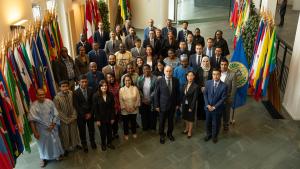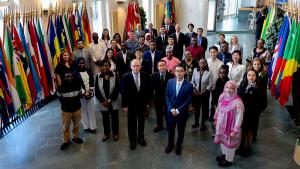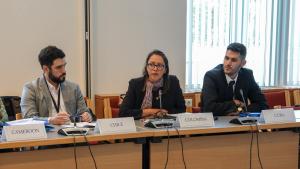Contributing to the development of chemistry and chemical engineering in Member States, with special emphasis on chemical safety
Scientists, chemical engineers, and technological specialists from Member States whose economies are developing or in transition are invited to take part in a capacity-building project to enhance their knowledge of the Chemical Weapons Convention and to develop the skills necessary to operate in a modern chemistry environment.
The course prepares participants for technical assignments within the Technical Secretariat and positions related to the implementation of the Convention, in their home countries.
The programme is conducted over nine weeks, each year, and is comprised of practical and theoretical modules.
Objectives
-
To facilitate national implementation of the Convention related to the chemical industry.
-
To offer training in areas related to chemistry and chemical engineering to personnel from industry, universities, and the government.
-
To facilitate trade in these areas through adoption of good practices in chemical industry.
-
To broaden the talent pool for positions related to industry in National Authorities, institutions, and economic positions in Member States as well as in the Secretariat.
Course Content
- Induction segment: Welcoming participants and providing an overview of the Convention and various aspects of the OPCW. This takes place at OPCW Headquarters in The Hague.
- University segment: Chemical engineering skills development. This segment takes place in weeks 2-4 at a well-known university in the territory of a Member State.
- Intermediate segment: Conducting practical exercises and visits to specialised institutions. This segment takes place at OPCW Headquarters in The Hague.
- Industrial attachment: Training in industrial operations. This attachment gives participants exposure to industry working environments and takes place in weeks 6-8 at various chemical plants.
Contributing to the peaceful uses of chemistry is a shared responsibility for all OPCW Member States.
By offering training to participants in areas related to chemical safety and security, industry directly supports the implementation of the Convention in developing countries and countries with economies in transition. This actively supports The Responsible Care® initiative.
- Final segment: Presentations of industrial assignments, research projects, and a final programme review. This segment takes place at OPCW Headquarters in The Hague.
Funding
Funding covers costs related to travel, accommodation, meals, course fees, and medical and travel insurance for all participants for the duration of the course.
Associate Programme News
More News- 2023 OPCW Associates Programme concludes The intensive nine-week programme for young and mid-career professionals focuses on enhancing international cooperation in promoting peaceful uses of chemistry
- OPCW Associate Programme: Immersive training programme upholds Chemical Weapons Convention in modern chemical industry Opportunity for mid-career professionals to gain practical experience and strengthen national implementation of Convention
- OPCW Flagship programme to develop national implementation and chemical safety opens Associate Programme focusses on implementation of Chemical Weapons Convention related to peaceful uses of chemistry



